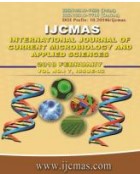


 National Academy of Agricultural Sciences (NAAS)
National Academy of Agricultural Sciences (NAAS)

|
PRINT ISSN : 2319-7692
Online ISSN : 2319-7706 Issues : 12 per year Publisher : Excellent Publishers Email : editorijcmas@gmail.com / submit@ijcmas.com Editor-in-chief: Dr.M.Prakash Index Copernicus ICV 2018: 95.39 NAAS RATING 2020: 5.38 |
Environmental degradation is the major conflicts in present day, due to excessive use of chemical fertilizers and pesticides, which creates deterioration of soil resources. The common practice of waste management is obtained by vermi-composting by using earthworms as bio-fertilizers. The Krishi Vigyan Kendra, Bastar set up vermi-composting unit as a model unit for demonstration and conducted training programme in Bastar district’s village like Madhota, Badechakwa, Bodanpal and Nadisagar, as they utilizes agricultural waste materials for vermi-compost as well as the bund side weeds. By using this vermi-composting technique the farmers of Badechakwa not only providing organic fertilizer also selling the earthworms `500/kg and earning `3500/tank in three months by vermi-compost. The scheme benefitted 38 farmers in Kharif season under 15 ha area, 60 &30 acre in Rabi season, which benefits 90 farmers of Bastar region. Vermi-compost used in Green gram, Chick pea and Field pea increased germination percentage of 92, 90 and 93 respectively and increased yield of 9, 14 and 12q/ha respectively. The vermi-compost applied in the Marie-Gold flower increased the number of flowers per plant i.e. average 30-32/plant and increased the flowers diameter of about 8.5cm maximum and gave yield 07t/ha with application of ½ ton vermi-compost and recommended dose of fertilizers applied by the farmers of Badechakwa. So, vermi-composting is the safe dispose of bio-degradable organic waste and provide additional income for landless farmers in rural agriculture.
 |
 |
 |
 |
 |